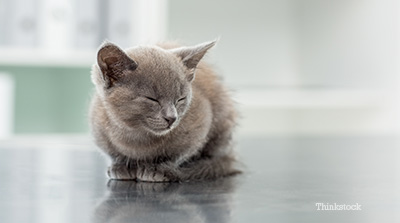For more from Dr. Ruth MacPete, find her on Facebookwww.drruthpetvet.com!

Your kids go to the pediatrician once a year, you see your dentist every 6 months, and even your car gets an oil change every 5000 miles; so why aren’t people taking their cats to the veterinarian for routine care? It seems hard to believe, but according to the American Humane Society, cats go the veterinarian half as often as dogs and many people only take their cat to the vet when their cat is sick.
The fact is cats get sick too! While they are masters at hiding illness, they also suffer from many of the same disease as their canine and human counterparts.
In case you didn’t mark your calendar, August 22nd is Take Your Cat to the Vet Day and it is a great time to remind everyone about the importance of preventive care. You wouldn’t dream of skipping your kids’ doctor appointments, so why should your cat’s veterinary check-ups be any different?
So what does your vet do during these routine visits and why are they important?
Physical Exam
Routine examinations allow veterinarians to check for signs of illness. In cats, these can be subtle and easy to overlook. Your vet will also do a head-to-tail exam to look for changes or abnormalities. The earlier medical issues are discovered and addressed the better the outcome.
Immunizations
Immunizations are an important way to protect pets from preventable infectious diseases. Your veterinarian will determine which vaccines your cat needs depending on their age, lifestyle and risk exposure.
Parasite Prevention
Your veterinarian will also check your cat for external parasites like fleas, ticks and ear mites, and check a stool sample for internal parasites, like roundworms, hookworms, tapeworms and coccidia. They will also discuss products available to prevent internal and external parasites.
Labwork
Depending on your cat’s age and physical exam findings, your veterinarian may recommend screening blood tests. Screening blood tests are an important way to detect diseases early, even before they become symptomatic. As cats age, diseases like diabetes, hyperthyroidism, and kidney disease become more common. Screening bloodwork is a great way to detect these diseases early so treatment can be started right away.
No one likes to go to the doctor and cats are no exception. In fact, many pet parents avoid taking their cat to the vet because their cat hates to go. If you find yourself chasing your cat all over the house, battling to get them into the carrier, listening to their non-stop meowing during the car ride to the vet, and dealing with a ticked off tiger at the vet, be sure to read my previous blog, “Tips for Getting Your Tiny Tiger to the Vet.” It has lots of helpful tips on how to make the trip to the vet less stressful for you and your cat.
It's a great time to make an appointment to bring your feline friend to the vet for a check-up! The goal of routine medical care is to prevent preventable illnesses and to detect diseases early while they are easiest to treat. Take advantage of the exceptional veterinary care available and bring your cat to the vet!
If you have any questions or concerns, you should always visit or call your veterinarian – they are your best resource to ensure the health and well-being of your pets.
